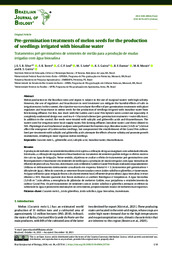Pre-germination treatments of melon seeds for the production of seedlings irrigated with biosaline water.
Pre-germination treatments of melon seeds for the production of seedlings irrigated with biosaline water.
Autoria: SILVA, J. E. S. B. da; TORRES, S. B.; LEAL, C. C. P.; LEITE, M. S.; GUIRRA, K. S; DANTAS, B. F.; MORAIS, M. B.; GUIRRA, B. S.
Resumo: Melon (Cucumis melo L.) has an estimated world production of 31 million tons and a cultivated area of approximately 1.3 million hectares (FAO, 2018). In Brazil, the states of Bahia, Ceará and Rio Grande do Norte are the main producers, with 80% of the cultivated area of the latter two destined for export (Kist et al., 2021). These producing states are located in the semi-arid region, whose crops are under high water demand due to the high temperatures and evapotranspiration rates, climatic characteristics that are inherent to this region (Bezerra et al., 2020). Abstract Melon production in the Brazilian semi-arid region is subject to the use of marginal waters with high salinity. However, the use of regulators and bioactivators in seed treatment can mitigate the harmful effects of salts in irrigation water. In this context, the objective was to evaluate the effect of pre-germination treatments with plant regulators and bioactivator in melon seeds for the production of seedlings irrigated with biosaline water from fish farming effluent. For this, two trials with the Goldex and Grand Prix hybrids were carried out separately. A completely randomized design was used in a 4 × 3 factorial scheme (pre-germination treatments × water dilutions). In addition to the control, the seeds were treated with salicylic and gibberellic acids and thiamethoxam. The waters used for irrigation were local-supply water, fish farming effluent (biosaline water) and these diluted to 50%. Physiological and biochemical analyses were performed for fourteen days. Biosaline water (5.0 dS m-1) did not affect the emergence of Goldex melon seedlings, but compromised the establishment of the Grand Prix cultivar. Seed pre-treatments with salicylic and gibberellic acids attenuate the effects of water salinity and promote growth modulations, resulting in more vigorous melon seedlings.
Ano de publicação: 2024
Tipo de publicação: Artigo de periódico
Unidade: Embrapa Semiárido
Palavras-chave: Cucumis Melo, Gibberellic acid, Irrigação, Melão, Salicylic acid, Salinidade, Semente, Thiamethoxam, Ácido Giberélico, Ácido salicílico, Água Salina, Água biossalina
Observações
1 - Por padrão são exibidas publicações dos últimos 20 anos. Para encontrar publicações mais antigas, configure o filtro ano de publicação, colocando o ano a partir do qual você deseja encontrar publicações. O filtro está na coluna da esquerda na busca acima.
2 - Para ler algumas publicações da Embrapa (apenas as que estão em formato ePub), é necessário ter, no celular ou computador, um desses softwares gratuitos. Sistemas Android: Google Play Livros; IOS: iBooks; Windows e Linux: software Calibre.
Acesse outras publicações
Acesse a Base de Dados da Pesquisa Agropecuária (BDPA) para consultar o acervo completo das bibliotecas da Embrapa.

